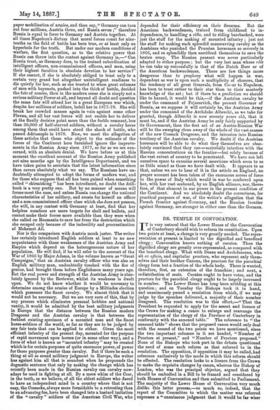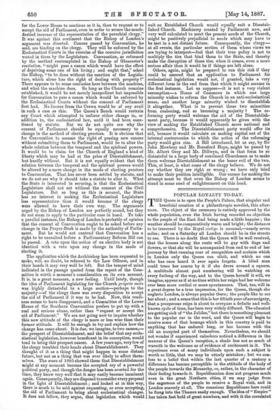DR. TEMPLE IN CONVOCATION.
IT is very natural that the Lower House of the Convocation of Canterbury should wish to reform its constitution. Upon two points at least, a change is very greatly needed. The repre- sentation at present is limited to the dignified and beneficed clergy ; Convocation knows nothing of curates. Then the dignified clergy are greatly over-represented, as compared with the beneficed clergy. What with Deans and Archdeacons, who sit ex officio, and capitular proctors, who represent only them- selves and their brother Canons, the proctors for the parochial clergy form but a fraction of the whole body. There is wanted, therefore, first, an extension of the franchise ; and next, a redistribution of seats. Curates ought to have votes, and the proctors for the parochial clergy ought to be largely increased in number. The Lower House has long been nibbling at this question ; and on Tuesday the Bishops took it in hand, and unanimously passed a resolution from which, if we may judge by the speeches delivered, a majority of their number disagreed. The resolution was to this effect,—" That the President be requested to apply for the assent and licence of the Crown for making a canon to enlarge and rearrange the representation of the clergy of the Province of Canterbury in conformity with the annexed table." The reference to " the annexed table" shows that the proposed canon would only deal with the second of the two points we have mentioned, since the two important columns in it are headed, "Number of Proctors at present," and " Number of Proctors proposed." None of the Bishops who took part in the debate questioned the need of some such reform as that referred to in the resolution. The opposition, if opposition it may be called, had reference exclusively to the mode in which this reform should be effected. The resolution looks to a licence from the Crown to make the requisite changes by canon, whereas the Bishop of London, who was the principal objector, argued that they should be embodied in a Bill to be framed and considered by both Houses of Convocation and then submitted to Parliament. The majority of the Lower House of Convocation very much dislike this latter process,—so much so, indeed, that the report of the Committee to which the matter was referred expresses a "unanimous judgment that it would be far wiser
for the Lower House to continue as it is, than to request or to accept the aid of Parliament, even in order to secure the much- desired increase of the representation of the parochial clergy." It was against this sentiment that the Bishop of London's argument was directed. Canons passed by Convocation, he said, are binding on the clergy. They will be enforced by the Ecclesiastical Courts in the exercise of the coercive jurisdiction vested in them by the Legislature. Convocation, as reformed by the method contemplated in the Bishop of Gloucester's resolution, "might pass a canon which would have the effect of depriving some one of his living ; and ought that," asked the Bishop, "to be done without the sanction of the Legisla- ture, which alone has the right of dealing with property I" There appears to be some confusion here between the machine, and what the machine does. So long as the Church remains established, it would be not merely inexpedient but impossible for Convocation to pass a canon which would be enforced by the Ecclesiastical Courts without the consent of Parliament first had. No licence from the Crown would be of any avail in such a case as this. The Queen's Bench would restrain any Court which attempted to enforce either change in, or addition to, the ecclesiastical law, until it had been sanc- tioned by statute. But we do not quite see why the consent of Parliament should be equally necessary to a change in the method of electing proctors. It is obvious that for Convocation to assume the right of passing new canons without submitting them to Parliament, would be to alter the whole relation between the temporal and the spiritual powers. It would be to claim for the Church of England a kind of liberty which may be had at the price of Disestablishment, but hardly without. But it is not equally evident that the relation between the temporal and the spiritual powers would be altered by a mere change in the mode of electing proctors to Convocation. That has never been settled by statute, and we do not see why it should take a statute to alter it. What the State is interested in securing, is that the Ecclesiastical Legislature shall not act without the consent of the Civil Legislature. But so long as this is secured, the State has no interest in making the Ecclesiastical Legislature leas representative than it would become if the clergy were allowed to have their own way. The arguments urged by the Bishop of London are perfectly sound, but they do not seem to apply to the particular case in hand. To take a parallel instance, the Bishop of London is probably of opinion that the consent of Convocation ought to be asked before any change in the Prayer-Book is made by the authority of Parlia- ment. But he would not contend that Convocation has a right to be consulted before a Parliamentary Reform Bill can be passed. A veto upon the action of an elective body is not identical with a veto upon any change in the mode of 'electing it.
The application which the Archbishop has been requested to make, will, no doubt, be referred to the Law Officers, and in their hands it may very well be left. But the temper of mind indicated in the passage quoted from the report of the Com- mittee is worth a moment's consideration on its own account. It is, in a great measure, a new feeling. Until lately, though the idea of Parliament legislating for the Church proprio mote was highly distasteful to a large section—perhaps to the majority—of the clergy there was every disposition to accept the aid of Parliament if it was to be had. Now, this readi- ness seems to have disappeared, and a Committee of the Lower House of the Southern Convocation prefers to put up with a real and serious abuse, rather than " request or aeoept the aid of Parliament." We are not going now to inquire whether this new attitude of the clergy is more or less wise than their former attitude. It will be enough to try and explain how the change has come about. It is due, we imagine, to two causes,— the prospect of Disestablishment, and the belief that any eccle- siastical legislation, however beneficent in its conception, would tend to bring this prospect nearer. A few years ago, very few of the clergy troubled their heads about Disestablishment. They thought of it as a thing that might happen in some distant future, but not as a thing that was ever likely to affect them- selves. The scare of 1885 showed them that Disestablishment might at any moment become the accepted cry of a powerful political party, and though the danger has been averted for the time, they know very well that it may easily become imminent again. Consequently, they are disposed to consider every proposal in the light of Disestablishment ; and looked at in this way, there is much to be said against requesting, or even accepting, the aid of Parliament to bring about ecclesiastical changes. It does not follow, they argue, that legislation which would suit an Established Church would equally suit a Disestab- lished Church. Machinery created by Parliament now, and very well calculated to meet the present needs of the Church, might be positively prejudicial to needs which may have to be met in a not distant future. Consequently, the clergy— at all events, the particular section of them whose views we are trying to interpret—feel that their true policy is not to multiply the ties that bind them to the State, and thereby make the disruption of those ties, when it comes, even a more serious affair than it would be if things are left alone.
Others, again, might be prepared to run this risk if they could be assured that an application to Parliament for ecclesiastical legislation would not, if granted, take a very different form in the end from that which it might assume in the first instance. Let us suppose--it is not a very violent assumption—a House of Commons in which one large minority wishes to reform the Church in an anti-ecclesiastical sense, and another large minority wished to disestablish it altogether. What is to prevent these two minorities from coalescing, and so becoming a majority ? The re- forming party would welcome the aid of the Disestablish- ment party, because it would apparently be given with the view of making the Established Church more national and comprehensive. The Disestablishment party would offer its aid, because it would calculate on making capital out of the internal controversies to which the action of the reforming party would give rise. A Bill introduced, let us say, by Sir John Mowbray and Mr. Beresford Hope, might be passed by Mr. Albert Grey and Mr. Dillwyn, and in that form be so distasteful to a large body of convinced Churchmen as to make them welcome Disestablishment as the lesser evil of the two. This, at least, is what some of the clergy believe. We do not say whether they are right or wrong ; we have only tried to make their position intelligible. Our excuse for making the attempt must be that even the Bishop of London seems to stand in some need of enlightenment on this head.



































 Previous page
Previous page